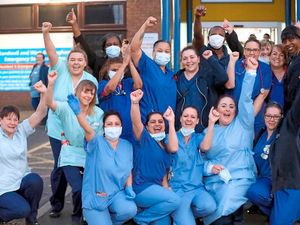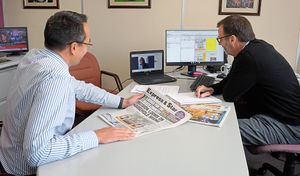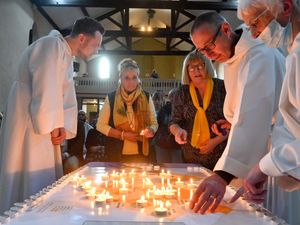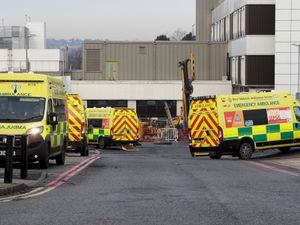Journalism Matters: Our role in recording the coronavirus fight
Journalism Matters is a new campaign to highlight the work of the media. Today we look back at our role during lockdown.

Our lockdown summer proved the value of accurate local journalism.
It is appropriate as we launch a week-long series to mark Journalism Matters that we concentrate on the events of an extraordinary year.
The Express & Star, along with our media colleagues at organisations like Radio WM, became an important lifeline to many who found themselves suddenly isolated.
Thanks to our online presence, as well as our team of dedicated newspaper boys and girls, we were able to continue to get important information to tens of thousands of readers each day.

As Britain went under lockdown in March, the Express & Star became a crucial lifeline to our communities keeping people informed as to what was going on in the outside world.
While factories, shops and offices were forced to shut down, the Express & Star continued to publish five different editions, six days a week, and also inform readers through our regularly updated website.
More Covid-19 coverage:
It wasn’t quite business as usual. In keeping with government guidelines, most of our staff found themselves working from home, but keeping in regular contact with editor-in-chief Martin Wright from the newspaper’s head office in Queen Street, Wolverhampton.
Conference calling has become a routine part of our day as the news agenda is discussed.
With fresh advice to work from home where possible, the newspaper and our online sites are now again being written and designed from a team of journalists working from their living rooms.

Our reporters, along with photographers Tim Thursfield, Tim Sturgess and Jamie Ricketts, have been out and about throughout the West Midlands and Staffordshire since March’s lockdown began.
But the guiding principles which have served this newspaper throughout its 146-year history remained the same – to provide readers with all the information they needed to get them through this difficult period.
We highlighted the challenging but hugely important work that health workers carried out – and continue to do – throughout the pandemic. We visited every hospital trust in the region, explaining what life was like in the front line, talking to the doctors and nurses who played such an important role in saving lives.
We also featured the equally important workers who were perhaps less visible during the crisis, including the community pharmacists, care-home workers, council staff and charity volunteers. We revealed the struggle of some pharmacists to get the right protective equipment from the NHS, and how they were using their own funds to top up items that were in short supply. Realising how the lockdown would leave some of the most vulnerable members of the community feeling lonely and isolated, we launched our Star Neighbours scheme with the aim of ensuring that nobody would be left alone.

We encouraged readers to fill out slips published in the paper, and drop it through the doors of any elderly or vulnerable neighbours, offering them help and support should they need it. We encouraged groups, organisations and companies to offer their services to those in need, and published daily noticeboards in our papers so people who would benefit from their help could get in touch.
The scheme has been praised by the Queen’s representative in the West Midlands, Lord-Lieutenant John Crabtree, who described it as heart-warming.
“I am tremendously proud of everyone who has rallied round during these past months, taking the time to consider others and do great deeds, no matter how large or small,” he said.
“It is important that we are able to say thank you to everyone who has contributed so much to our region.
“The Express & Star recognition of Star Neighbours is heart-warming and I want to thank them for the contribution they are making.
“As the pandemic continues to affect all our lives, we will continue to thank everyone making such great efforts within their communities.”

The lockdown had a devastating economic impact on our area, as people were laid off work or placed on the furlough scheme, and we took on the role of not only informing people about the support that was available, but revealing the demands the crisis was placing on those at the forefront of providing such help.
We visited the food banks working hard to ensure everybody had food during the lockdown, shining a light the efforts of the volunteers who kept them running throughout.
We reported how some food banks saw a 10-fold increase in demands on their services at the beginning of the lockdown, as many people who had never experienced serious hardship before were finding themselves unable to provide food for their families.
The Express & Star also covered the work that was being done to support the homeless during the pandemic, and how it was placing extra demands on the people who tried to help them. The Government instructed local authorities to provide temporary accommodation for all rough sleepers during the outbreak, and made funds available for emergency accommodation.
But while this might have meant that the problem was now out of sight, it was definitely not out of mind for the charities that help the homeless.
Tom Hayden, of the Good Shepherd Ministry in Wolverhampton, revealed how fears about the virus made it more difficult for people to sleep on a friend’s sofa while they looked for new accommodation.
The lockdown restrictions also forced the charity to change the way it operated, having to close its canteen and instead provide food parcels and takeaways.
Mr Hayden said at one point a record 170 people turned up in one day seeking emergency food supplies.
Briefings
The Express & Star regularly took part in the daily Downing Street briefings, highlighting the impact of the restrictions on our schools, businesses and communities, and grilling cabinet ministers about the need so support those affected.
We tackled ministers about how social distancing measures would be imposed in schools, and the impact they were having on the tourism and hospitality sectors. We reported on the concerns from leaders in the tourism and hospitality trades, and the measures they were taking to ensure their customers would be safe as the rules were eased.
But is hasn’t all been heavy stuff. Early on during the lockdown, we realised that many people would be missing many of the social activities that were no longer possible due to the restrictions. So we printed our own pub quiz, which people could play in their own homes, or even through video conferencing if they felt adventurous. It proved so popular that it has continued.
When the restaurants were forced to close, we reported on how they were reinventing themselves as takeaways, and our food critic Andy Richardson reviewed some of the best of these.
We kept in touch with pub landlords throughout the shutdown, telling how some were offering take-out services, while also revealing their fears for the future. As the lockdown restrictions eased, we threw our support behind the hospitality sector.
And with most sports now being played behind closed doors, our unrivalled coverage from grassroots to elite levels, is more important than ever.
The E&S has always been at the heart of the community and for some people has provided a contact with what is going on in their localities.
It has been a privilege to help our loyal band of readers through this difficult time.





